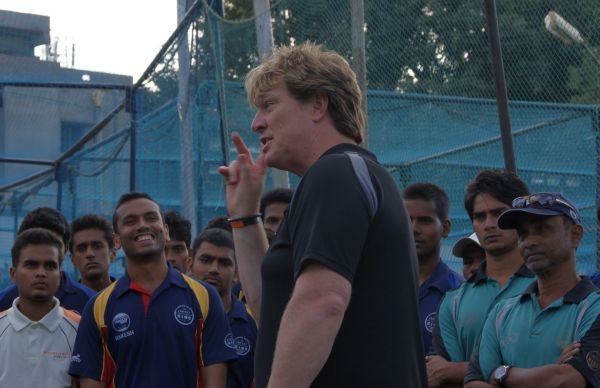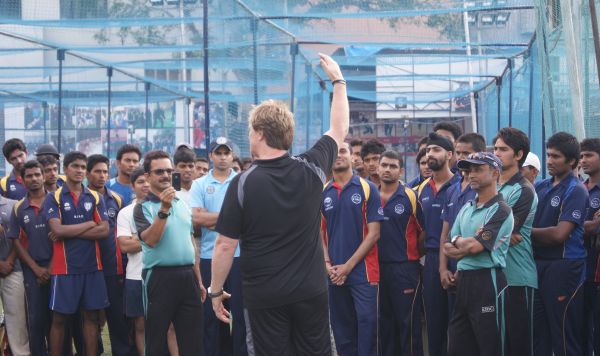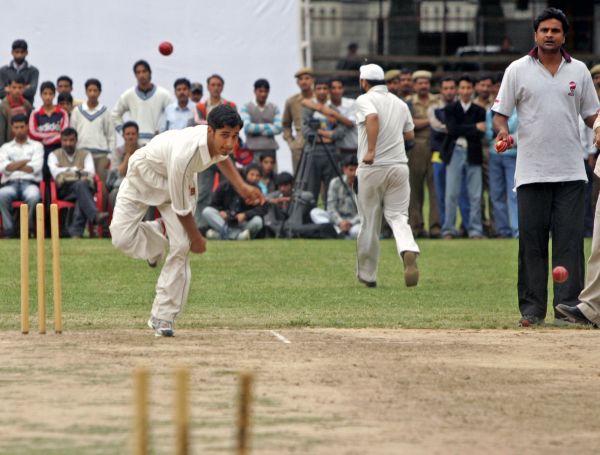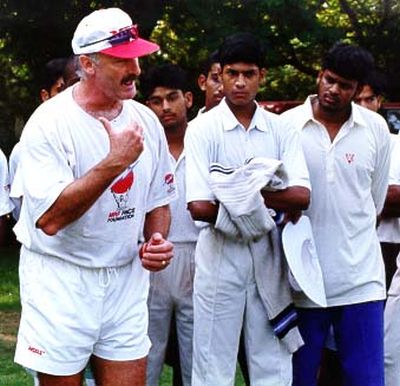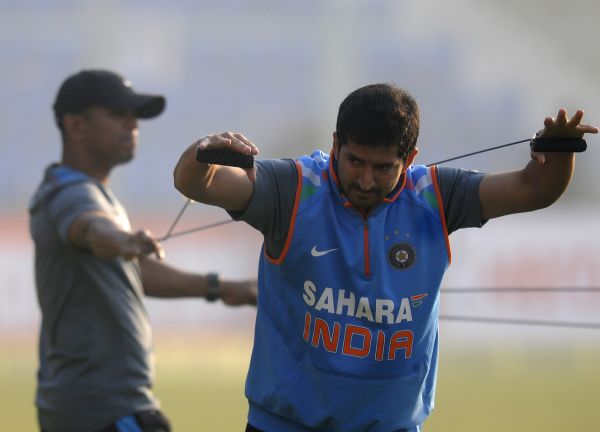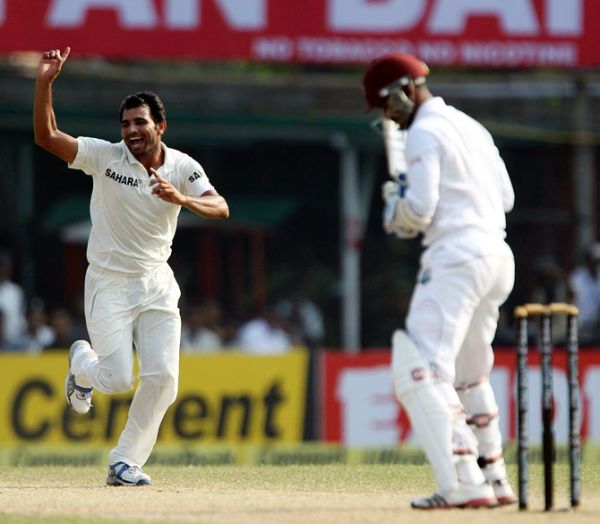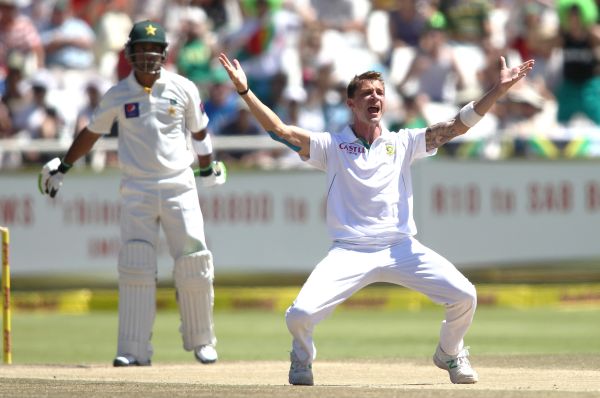 | « Back to article | Print this article |
'Mohit Sharma has the basics to make it at the top'
Fast bowling coach and biomechanics expert Ian Pont talks to Manu Shankar about a new facility in Bangalore for aspiring pacers.
Fast bowlers, it is said, are a rare commodity. And when it comes to India, rare becomes rarer.
For years now, the MRF Pace Academy in Chennai has solely nurtured fast bowling talent, and with much success.
But come January, Bangalore could well be the next home for those aspiring to bowl genuinely quick thanks to Ultimate Pace Foundation, an initiative set up together by the Karnataka Institute of Cricket (KIOC) and Ian's Mavericks Cricket Institute (MCI).
Pacers will be able to hone their skills under the guidance of world renowned coach Ian Pont.
Known for a powerful throw after a brief foray into the world of baseball, Pont, who worked with the Haryana Ranji Trophy team in 2011, mainly played for Essex during his career.
He was Bangladesh’s bowling coach during the 2011 World Cup and also coached Bangladesh Premier League (BPL) franchise Dhaka Gladiators.
He is now on a mission to unearth youngsters who have a passion for pace. In a freewheeling chat with Manu Shankar the former English cricketer talks about the foundation, the expectations and why India’s new pacer sensation Mohammad Shami has impressed him.
Tell us about the Ultimate Pace Foundation. How did the idea come about?
For many years now I have wanted to establish a pace foundation in India, but hadn't found the right place or time to do it. Through meeting Mr Irfan Sait at KIOC (Karnataka Institute of Cricket) in Bangalore, we realised we had much in common.
He has been very supportive of my coaching methods and has a passion for development of wonderful cricketers. It was a real meeting of minds. The Ultimate Pace Foundation is, therefore, based at his facility.
'We will be focusing on developing a bowler's natural pace'
What are the areas you will be concentrating on?
It's hard to be a genuine fast bowler if you don't actually bowl fast. So we will be focusing on developing a bowler's natural pace and showing them how to improve their control, too.
Speed can be improved, and we have found a way to teach this as a process. Plus, we will also work on the range of deliveries a bowler needs to be successful, as well as work across skills for Ranji, IPL and one-day style bowling. Basically, if you are a fast bowler, you will want to attend.
Bangalore has one of the most sporting wickets in the country. Is that the reason why the city was chosen to set up the academy?
Bangalore offers a few great things. The first is the weather; the second is the facility at KIOC, which includes floodlights.
In addition, Bangalore is easy to get to by plane, road and train. The pitches around Bangalore, and outside of this facility, were not a factor.
'Almost every Indian quick ends up bowling medium pace despite having an exciting debut'
India is not renowned for producing fast bowlers. What is the reason for that?
A lack of fast bowling icons doesn't help. Most young lads in India grow up wanting to be Sachin [Tendulkar], Virat Kohli or [Viredner] Sehwag.
The only quicks that inspire them are pretty much Dale Steyn and Brett Lee, or others they see from overseas in the IPL. That and the fact that virtually every bowling coach tells a young fast bowling prospect to slow down and bowl a line and length.
Do you feel there aren’t enough fast bowling coaches, so to speak?
I don't feel there are any fast bowling coaches around teaching speed into bowlers. And that’s the whole issue really. I know thousands who teach speed out of bowlers, though.
Almost every Indian quick, after a few years, ends up bowling medium pace despite having an exciting debut.
The majority seem to end up far slower than they started. It's all about how you encourage, handle and ultimately coach fast bowlers. That's important.
The general trend that we have seen with fast bowlers in India is that they come up as tearaway fast and then settle down as medium pacers. What does it take to become a Shoaib Akhtar or Brett Lee?
This is the very point I just made. It's so easy to kill a young fast bowler's dream by discouragement. Not all the pitches are going to be pace-friendly either. So, you have to have a big heart and a passion for speed.
'The Ultimate Pace Foundation employs the latest cutting edge coaching methods'
The MRF pace foundation has been the pioneering fast bowling academy in India, but it hasn’t produced a genuine quick for the country.
MRF is the only fast bowling academy as well. But it's really for the top players to go and get high-profile support, after they have already made it.
You can't just walk in off the street and get coaching there. As with any academy, you are only going to make a difference if you allow for people's limitations and give them a new set of tools to work with.
The Ultimate Pace Foundation is a 'people's foundation' and also one which employs the very latest cutting edge coaching methods to increase speed and accuracy.
Injuries are often a curse for fast bowlers; will you also be concentrating on injury management?
Fast bowlers put huge strain on their bodies, so will be injured more than anyone else. The amount they bowl needs to be managed, plus they have to be strong enough to cope with those forces going through their bodies. The big thing is also to ensure they have safe and efficient actions in the first place.
'Mohit has a simple action, with not much to go wrong'
You were with the Haryana Ranji Trophy team as coach-cum consultant. Could you share your experience?
I liked working with the lads at Haryana. Both Harshal Patel and Mohit Sharma came through in my time there. They have others, too, who could develop with the right coaching and support.
Haryana are under achievers given the depth of talent they have. I feel there is a lot more to come from there.
Mindset is important. Players have to go and express themselves and not be afraid to fail. If they play to their full potential, I believe Haryana are a match for any other state.
You were impressed with Mohit Sharma; now he is in the Indian team…
He obviously had a good start with his previous coaches/academy. But Mohit was keen to learn and develop. The thing that impressed me was this ability to take on new information. He has a simple action, with not much to go wrong. Sometimes that is easy to read, though; so having variations in deliveries is the next level for Mohit for him to be a large scale success at the international level.
He has the basics to make it at the top. If he can keep his pace around 140 kph and work on an in-swinger, he has a great future.
'Shami has impressed me because he can hit the deck hard'
Umesh Yadav and Mohammad Shami are currently the quickest in India (Varun Aaron being injured). Anyone else who has caught your eye?
Shami is someone I like. He impressed me because he can hit the deck hard. Yadav is focusing a bit more now on his line and length, which is fine, but, again, he needs to maintain his speed. There are several Ranji bowlers who can perform, but whether they have it in them to go all the way, who knows? Not many can crank it up over 140 these days.
With the evolution of T20s and ODI rule changes, do you think fast bowlers will have an equal amount of say than they otherwise have in Test matches?
Cricket is, and has always been, a batsman's game and most rule changes are geared up to add more runs to the total. But bowlers can be smart by improving their skills in the way batsmen have introduced new shots. Sometimes, a good, old-fashioned yorker sorts out a batsman, whether in a T20 or Test match. Developing control over each delivery is more important to combat batsmen than ever.
'Steyn, Morkel among the best pacers at the moment'
How much does the height/genetics factor play in the fast bowling department?
If you are tall, you have longer levers; but, then, you don't want to waste them with a poor action. If you think of [Chris] Tremlett, who is a man-mountain, but only bowls at 125-130 most of the time, then you understand it isn't always about build. Indian fans are obsessed with height, and also diets, but neither are they key factors in pace.
Alignment, how fast and far you move the ball through your action, sequencing, and timing are far more important than someone's build, background or what food they eat.
Currently, who is the best pace package in the world?
Three South Africans: Test Cricket - Dale Steyn; ODI - Morne Morkel; T20 - Alfonso Thomas. Across all three it has to be Steyn, although in ODIs he is less effective.
Pakistan is known to have a factory of pacers who are genuinely quick. Is it something to do with the mentality?
It’s about history, expectation, icons and the fact that no one tells them to slow down.
